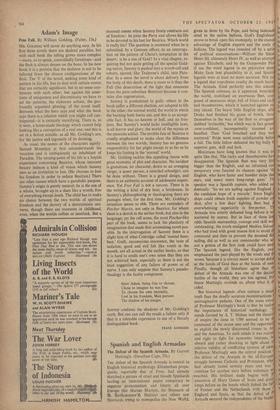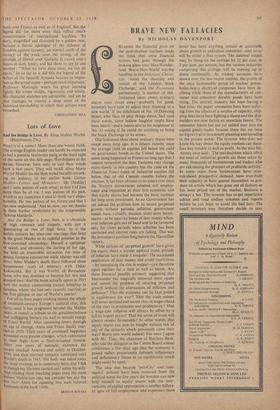Spanish and English Armadas
The Defeat of the Spanish Armada. By Garrett Mattingly. (Jonathan Cape, 25s.)
THE defeat of the Spanish Armada is central to English historical mythology. Elizabethan propa- ganda, especially that of Foxe, had already sketched a picture of cruel and bloody Spaniards leading an international papist conspiracy to suppress protestantism and liberty all over Europe (the Marian Martyrs, the Massacre of St. Bartholomew's). Hakluyt and others saw Spaniards trying to monopolise the New World, given to them by the Pope, and being hideou cruel to the native Indians. God's Englisfur strove to break open this monopoly, to the mut advantage of English exports and the souls Indians. The legend was rounded off by a set of political assassinations—William the Site Henri III, ultimately Henri IV, as well as attem against Elizabeth; and by the Gunpowder P1 (I use the word legend in no pejorative se
n Many facts lent plausibility to it, and Span legends were at least no more accurate. Nor c a legend that reprobates cruelty do much hart The Armada fitted perfectly into this schen The Spanish colossus, as it appeared, bestridi the world, mobilised an enormous fleet, co posed of enormous ships, full of friars and rac and thumbscrews, which it launched against c tiny island. The brave little English ships, of Drake had finished his game of bowls, thr themselves in the way of the fleet so arrogan dubbed 'invincible,' but which was in fact gros: over-confident, incompetently manned a handled. Then 'God breathed and they wt scattered.' Pride went most satisfactorily beft a fall. The little fellow defeated the big bully superior guts, skill and luck.
Historians .have long known that it was r quite like that. The racks and thumbscrews ha disappeared. The Spanish fleet was very lit bigger than the English, and no informed cc temporary ever fancied its chances against 't English, who have faster and handier ships th ours, and many more long-range guns.' T speaker was a Spanish captain, who added Si donically: 'So we are sailing against England the confident hope of a miracle.' Since Engli ships could obtain fresh supplies of powder a, shot, after a few days' fighting they had overwhelming superiority in fire-power. T Armada was utterly defeated long before it w scattered by storms. But in face of these lo: odds Spanish seamanship, courage and skill we outstanding; the much maligned Medina Sidon' who had tried with good reason first to avoid t command and then to prevent the doomed fit sailing, did as well as any commander who w not a genius of the first rank could have dor The Spanish legend, like the English, ove emphasised the part played by the winds and tl waves 'because it is always easier to accept deft at the hands of God than at the hands of me i Finally, though all historians agree that tl defeat of the Armada was one of the decisi battles of the world, they are less agreed, Pr fessor Mattingly reminds us, about what it d cided.
But historical legends often contain a deep truth than the deadly accurate reconstructions unimaginative pedants. One of the main virtu of Professor Mattingly's book is that he realis the importance of historical mythology. 1 minds formed by A. T. Mahan and the theori$ of empire the issue in 1588 seemed to be tt command of the ocean seas and the opportunil to exploit the newly discovered routes to M and the Americas. To such minds it was ratiort and right to fight for economic interests, to absurd and rather shocking to fight about it relative validity of conflicting systems of idea' Professor Mattingly sees the central position the defeat of the Armada in the all-Europea struggle between Catholic and Protestant, whit had already lasted seventy years and was continue for another sixty before stalemate 4reached. His brilliant study begins with 111 execution of Mary Queen of Scots and aIwa keeps before us the bonds which linked the fats of France and the Netherlands with those ti England and Spain, so that the defeat of ill Armada ensured the independence of the Nettie
'It h
sly et
1.1a 0 ie nl pt of Is a
ni
nr if 10 tl
V "1. tt to sl
i
b it 1 '5
a A ; jt lands and France as well as of England. But the legend did far more even than reflect men's consciousness of international loyalties. 'Its story, magnified and distorted by a golden mist, ;became a heroic apologue of the defence of freedom against tyranny, an eternal myth of the victory of the weak over the strong, of the triumph of David over Goliath. It raised men's hearts in dark hours, and led them to say to one another : "What we have done once, we can do again." In so far as it did this the legend of the defeat of the Spanish Armada became as impor- tant as the actual event—perhaps more important.' Professor Mattingly wears his great learning lightly. He writes vividly, vigorously and wittily. His character sketches are admirable; and yet he also manages to convey a deep sense of the historical inevitability in which their actions were enmeshed.
CHRISTOPHER HILL







































 Previous page
Previous page